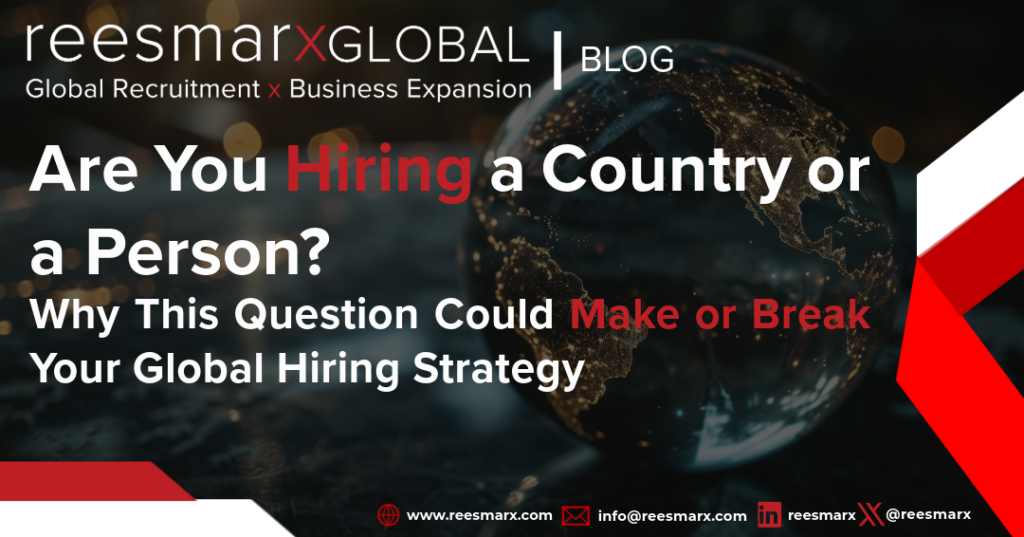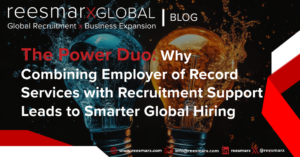When companies decide to expand globally or tap into international talent markets, one fundamental question often gets overlooked:
Are you hiring a country, or are you hiring a person?
This distinction may seem subtle, but the implications are massive—impacting everything from compliance and costs to retention and productivity. Misaligning your strategy with the answer to this question could lead to talent loss, legal complications, or growth stagnation.

The Question That Changes Everything
When companies enter a new market, they often approach hiring with a country-first mindset…“we need someone in Germany,” or “we’re opening a hub in Singapore.”
But this mindset is drastically different than…“we need this person who happens to live in Germany or Singapore.”
Framing matters. A country-first approach implies infrastructure, regulation, cost planning, and long-term strategic investment. A person-first approach leans on flexibility, skills, and immediate impact.
You need to know which lens you’re looking through before making operational decisions.
Why It Matters: The Data Behind the Question
The importance of aligning your hiring mindset with business strategy is backed by numbers:
- 67% of global companies say their biggest challenge in global hiring is underestimating local compliance risks.
- Hiring through a local legal entity in a new country can cost between $15,000–$100,000 in setup and compliance fees.
- Companies that use an Employer of Record (EOR) to hire specific people without setting up infrastructure saw 40% faster hiring cycles and 20% higher retention in the first year.
- Non-compliance with local labor laws results in fines or legal action for 38% of first-time global employers
.

These statistics underscore a key insight: If you don’t define whether you’re committing to a market (country) or a person, you risk building the wrong infrastructure—and burning money, time, and trust.
Framing the Decision: Country vs. Person
Here’s a breakdown of the strategic implications of both approaches:

Steps to Answer the Question Effectively
Answering “Are we hiring a country or a person?” should be a structured process—not an afterthought. Here are the steps to do it right:
Step 1: Clarify Your Primary Goal
Ask: Is this hire intended to grow our presence in a new market, or to fill a role regardless of location?
If it’s market-driven, think infrastructure. If it’s skills-driven, prioritize agility and speed.
Step 2: Evaluate the Talent Pipeline
Look at your candidate pool. Are you seeing talent clusters in a specific country? Are certain individuals key to your strategy, regardless of location?
Let the talent guide your approach—but don’t let location drive the whole strategy unless it aligns with your long-term roadmap.
Step 3: Align with Legal & Compliance Frameworks Early
This is where companies often stumble. Before committing to hire, consult with:
- Global mobility experts
- Employer of Record (EOR) platforms
- Local legal counsel (if you plan to establish a presence)
Make sure your HR team knows the difference between a direct hire, EOR hire, and contractor in your target country.
Step 4: Calculate Long-Term ROI
Don’t just compare salaries. Include:
- Cost of entity setup
- Time-to-hire
- Retention risks
- Compliance risks
Hiring through an EOR may seem more expensive short-term, but may save you six figures if your goals shift later.
Step 5: Document the “Why” in Your Hiring Plan
Make your reasoning transparent to stakeholders. For each international hire, include a note:
“We are hiring this person for their unique expertise. We are not committing to establishing a presence in this country at this time.”
This kind of clarity prevents cross-functional confusion and sets proper expectations.
Conclusion: Hire With Intention, Not Assumption
In today’s global hiring landscape, where talent is borderless but compliance is not, the question “Are we hiring a country or a person?” is more than philosophical—it’s foundational.
Answer it with care. Your company’s growth, agility, and legal standing depend on it.






